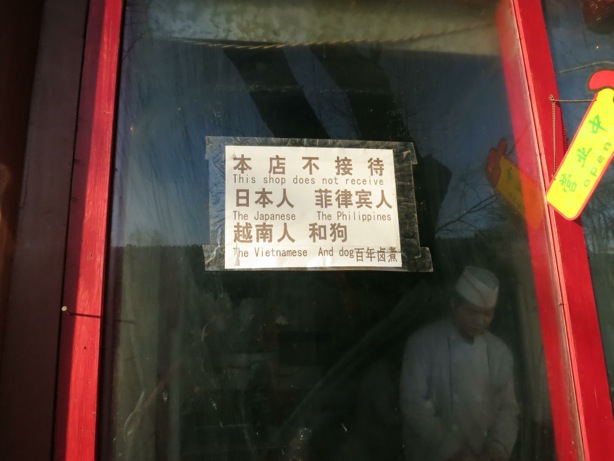The idiot restaurant owner in Beijing who stuck the racist sign in the photo below outside his restaurant has now taken it down again, it transpires. The sign is bilingual, and the English (or rather the Chinglish) reads "This shop does not receive The Japanese The Phillippines The Vietnamese and dog."
The sign announces that people from the three countries currently involved in territorial disputes with China over uninhabited islands, and also dogs, will not be served. The reference is to the famous sign which supposedly once existed in Shanghai when it was occupied by foreign powers, forbidding "Chinese and dogs" from entering the premises.
The restaurant in question is located in Houhai, a touristy area of central Beijing which straddles a lake. The restaurant owner claims he has no regrets, but he was just getting too many phone calls about it. I'm glad to know somebody still cares. I hope there were many Chinese calling too.
Last week, British member of Parliament George Galloway walked out of a debate in Oxford University when he found out that the student he was debating against was Israeli. The motion of the debate was "Israel should withdraw from the West Bank immediately". After realizing that the other debater, who had an Israeli name, was indeed Israeli, Galloway got up and said "I don't recognize Israel and I don't debate with Israelis" as he walked out of the door. If not recognizing Israel can be considered legitimate, not debating with people because they were born in a certain country is just as bad as not serving them in your restaurant.
Let's hope the principle that you should never discriminate against people on the basis of the country they were born in spreads wider and wider in the future, to include all Beijing restaurant owners and all British Members of Parliament.
The sign announces that people from the three countries currently involved in territorial disputes with China over uninhabited islands, and also dogs, will not be served. The reference is to the famous sign which supposedly once existed in Shanghai when it was occupied by foreign powers, forbidding "Chinese and dogs" from entering the premises.
The restaurant in question is located in Houhai, a touristy area of central Beijing which straddles a lake. The restaurant owner claims he has no regrets, but he was just getting too many phone calls about it. I'm glad to know somebody still cares. I hope there were many Chinese calling too.
Last week, British member of Parliament George Galloway walked out of a debate in Oxford University when he found out that the student he was debating against was Israeli. The motion of the debate was "Israel should withdraw from the West Bank immediately". After realizing that the other debater, who had an Israeli name, was indeed Israeli, Galloway got up and said "I don't recognize Israel and I don't debate with Israelis" as he walked out of the door. If not recognizing Israel can be considered legitimate, not debating with people because they were born in a certain country is just as bad as not serving them in your restaurant.
Let's hope the principle that you should never discriminate against people on the basis of the country they were born in spreads wider and wider in the future, to include all Beijing restaurant owners and all British Members of Parliament.

4 comments:
Jixiang,
Good post. By the way, from our conversation a while back, I did manage to talk to that linguist person that I know about. According to him, the Mandarin language gradually came into being in the Yuan dynasty and then became more or less the standard language by the Qing period. Of course, there were also changes/modifications to the language throughout that entire time and even after. However, I think the point is that Mandarin does have quite a bit of history. I believe we both agree on that. This is just to let you know what I have found. Thanks.
Scottie
Thanks!
About Mandarin, the thing is that the term "Mandarin" is used to refer to two different things in English. One is a group of related dialects spoken throughout Northern and Southwestern China, oftern referred to in Chinese as 北方话, in other words Northern Chinese. This indeed came into being during the Yuan dynasty, and is what your linguist friend is speaking about.
The other one is 普通话 or 国语, the official language of modern China, codified in the early twentieth century and based mainly on the Beijing variety of 北方话. The use of "Mandarin" for both these concepts causes confusion.
The standard written language during the Qing period was 文言文 or literary Chinese, although novels were increasingly written in 白话, a written vernacular which was indeed usually based on Northern speech, and became the base for the creation of modern 普通话.
Well, as you noted, Guoyu or Putonghua is based on Beifanghua. There were also standardization measures already under way in the 18th century, but of course the task was completed in the 20th century.
I think when most English speakers use the word "Mandarin" they are referring to the standard language of China these days. But either way, I think there is no real disagreements between us here.
Yes, I think these is no real disagreement between us here, more an exchange of facts.
Post a Comment